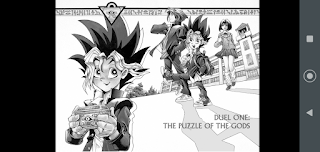Yu-Gi-Oh! #1-10
Originally released in 1996
Written by Kazuki Takahashi
Art by Kazuki Takahashi
Yu-Gi-Oh is a series that's definitely known for extremely dramatic card games. It took a while to get there, though not as long as I thought. The series is about Yugi Mutou, a short quiet boy who seeks to complete the Millennium Puzzle, which will supposedly grant the wish of whoever completes it. Yugi's wish is a humble one - he wants to make more friends.
By all appearances, his only friend (and his crush) is Anzu Mazaki, though that changes quickly with the introduction of two delinquents named Katsuya Jonouchi and Hiroto Honda. (the characters are named Tea, Joey, and Tristan, respectively, in the dubbed anime - I'm not sure why Yugi's name remained unchanged, though it being part of the title might have something to do with it) The two of them bully Yugi at first, but when he stands up to a bigger bully to save them, Jonouchi becomes close friends with Yugi. (Honda takes a bit longer, and he doesn't really do much in these chapters)
However, completing the Millennium Puzzle also allowed a dark spirit from ancient Egypt to take over Yugi's body, acting as a karmic judge of sorts along with a master game-player. In these early chapters, the dark Yugi acts like a lesser version of Marvel's Ghost Rider or DC's Spectre, punishing those who have done wrong or seek to humiliate, hurt, or kill Yugi and his friends.
For the most part, the dark Yugi sticks to illusions to punish his victims, though he occasionally causes people to suffer the consequences of their greed or willingness to break the rules. (he gets a little more extreme as these first few chapters go on, though, including a game of table hockey that involves explosives)
Nobody gets a clear glimpse of the dark Yugi aside from his victims, though after he saves her life from an escaped criminal while she's blindfolded and being held hostage, Anzu develops a crush on the dark Yugi based on his voice, not realizing who it belongs to. I'm not sure at what point that will change, though I know that the characters will still trust their friend.
One thing that I liked about these early chapters is that the spirit of the puzzle isn't infallible - once the series focuses on card games, it's impossible for him to lose, but some of these early games involve contests of strength, and given that he's limited to Yugi's scrawny body, he has to think on his feet to figure out how to win.
To my surprise, chapter 9 introduces Seto Kaiba as a classmate of Yugi's in the series' first two-part storyline, along with the game of Duel Monsters - I thought that wasn't introduced until much later. I'm not sure how much the anime changed compared to the manga, though I know that the anime left out these early parts, but after the events of chapter 9, Yugi really should have learned to stop letting people take his ultra-rare/powerful cards when they say that they just want to look at them.
When Kaiba uses this trick to steal the Blue Eyes White Dragon card that is precious to Yugi's grandfather, Yugi challenges him to a game of Duel Monsters to get it back. It's funny to look back on this chapter given how much the card game would come to dominate the series, because it's so odd to see cards that give a 20% increase to attack (which would result in some really odd stats for some monsters), or to see Yugi's trump card, the most powerful card in his deck, being...
...the Summoned Skull. (it's powerful for its level, but it being referred to as one of the five most powerful cards in the entire game, along with it being treated as Yugi's signature monster, seems strange in hindsight since he'd be better known for using the Dark Magician)
Knowing what comes later, it felt strange at times to go back to these old chapters - for example, it was a little jarring to see Seto Kaiba as an ordinary classmate at Yugi's school, given that he's portrayed in the anime as a millionaire who didn't know Yugi before the series began and actively tries to avoid associating with Yugi and his friends. Still, these lower-stakes storylines make for an interesting contrast to what comes later (there's not one single ancient Egyptian laser beam, and both the Millennium Puzzle and the spirit that's within it are unique entities), and it was fun to see how the series went from relatively grounded events to a setting where card games seemingly decide every aspect of society.














No comments:
Post a Comment